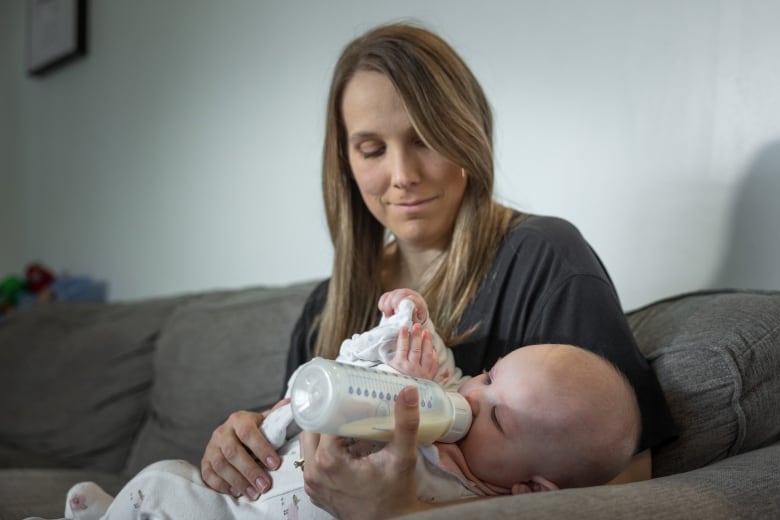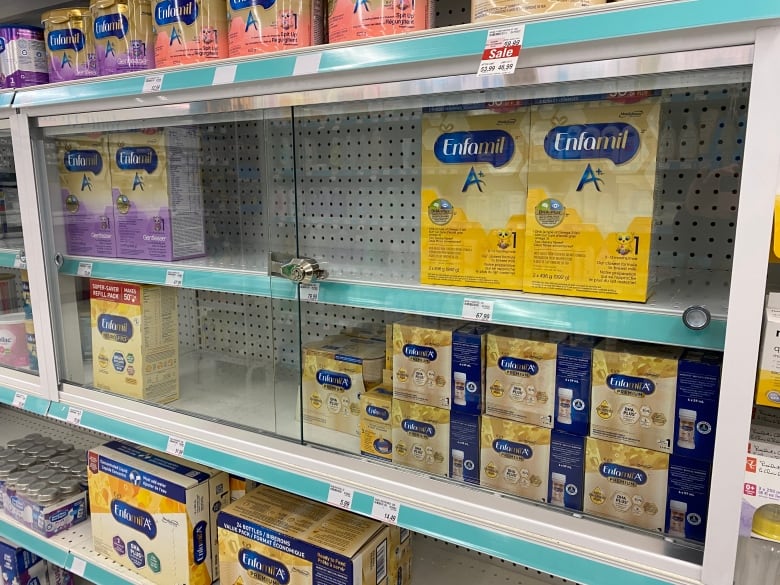As the cost of infant formula continues to climb across Canada, many families are being forced to hustle for coupons or rely on charity to feed their babies.
The average price of formula jumped 30 per cent between February 2022 and February 2024, according to Statistics Canada.
But Shadia Foster believes the gap has widened even farther in the last two months since store-brand formula seemingly vanished off store shelves in Nova Scotia — part of a North America-wide shortage that began two years ago.
She has no choice but to buy the more expensive brand-name products for her three-month-old daughter, Lila.
“When we had to switch fully to formula and I started looking around, it was just really disheartening to see the high cost and the lack of variety in different formulas,” said Foster.
She said she’s paying about double the amount compared to when she had her first daughter four years ago.
Stocking up whenever possible
In the same suburban neighbourhood of Beaver Bank, Samantha Nicholson is experiencing a similar price shock. She has three children under the age of four — all were formula-fed. Her youngest, also Lila, has tried multiple brands as Nicholson furiously navigates supply issues.
She often e-transfers money to friends and family when they see formula on sale and pick it up on her behalf.
“[Lila is] only five months old and I can’t tell you how much money I’ve spent just sending people money or bulk buying or anything like that,” Nicholson said.
“Lying awake in bed wondering if you’re going to be able to feed your kid is just a gross feeling. It’s not nice and it’s something that feels very out of your control.”

Last week, Nicholson said Kirkland-brand formula reappeared in Nova Scotia after a six-month hiatus on store shelves, so she rushed to Costco to stock up. However, it’s still much more than what she paid with her first child. In 2021, she spent $28.99 for powdered Kirkland formula. The most recent canister was $43.99. The supply lasts about three days.
For other brands tailored to dietary sensitivities such as lactose, the price can be closer to $70.
Food, Health and Consumer Products Canada, a group that represents formula manufacturers, told CBC Information Morning Halifax the Canadian supply is “stabilizing” after a recall in the U.S. staggered production in February 2022. However, the group said the cost of making formula has also increased in recent years.

Foster, who runs a Facebook group dedicated to formula concerns, said families are constantly weighing in about their struggles to find and pay for formula.
“There are women who are saying they’ll drive anywhere to get coupons,” said Foster.
“We shouldn’t have to do that. We should be able to easily go out and buy formula that’s affordable and feed our babies.”
Low-income reality
At The North Grove in Dartmouth, staff have also witnessed a surge in desperation. The centre offers programs and resources for families in need, including food.
Executive director Wendy Fraser said formula is a popular request.
“I would say out of every seven parents who come in asking for it, we’re able to provide for one,” she said.
“We have a lot of newcomers here. We have a lot of young, single-parent families who are on limited incomes. And so even if you’re fortunate and you have $1,000 to spend … if you’re spending $65 for one can of formula, you still have to pay rent and everything else … it becomes nearly impossible.”
Fraser said the result is that many parents are choosing to forgo meals for themselves, or stretching their formula supply to make it last longer.
Dr. J Mathew Abraham, a family physician in Nova Scotia, has also talked to patients who “water it down.”
“It’s a concern because the actual formula will lose its nutritional value. It’s supposed to be made in a certain way. If you water it down, you’re going to lose some of that nutritional value and that’s going to adversely affect the health of the baby,” he told Information Morning Halifax.
‘Should be covered,’ says Halifax doctor
Abraham would like to see Ottawa include baby formula in its proposed pharmacare plan intended to cover medications such as birth control and diabetic supplies.
“It’s not a traditional medicine, but it actually should be. It’s a medical essential item that should be covered,” he said.
He has written several politicians, including local members of Parliament and Premier Tim Houston.
The province of Nova Scotia recently enhanced support to several community organizations, providing $200,000 grants to help pay for rising food costs generally. Maggie’s Place Family Resource Centre in Cumberland County was part of last year’s pilot program.
“We used to rely on donations. But since we’ve had this new funding, we’ve been able to use it for formula,” said Kate McNeil, prenatal and postnatal co-ordinator at Maggie’s Place.
“We’ve given out more formula in the past year than we ever have.”
The North Grove also received $100,000 to “increase access to healthy foods for vulnerable Nova Scotians,” according to a spokesperson with the Department of Community Services.
Formula in other countries
Foster argues the funding should be more universal, similar to a government-run program in the U.S. The Special Supplemental Nutrition Program for Women, Infants, and Children, commonly known as WIC, provides monthly food packages to low-income families. It allows participants to use an electronic card to buy the approved food and beverages at their local store.
Under the program, babies are eligible for formula amounts up to 26 litres, or roughly 110 bottles per month.
In several European countries, the rising cost of formula has also been a hot-button issue — yet it remains half the price compared to Canada.
Abraham said that isn’t right.
“I have a lot of patients who are mothers who are trying to breastfeed and cannot breastfeed and they rely on infant formula and they’re distressed. They’re absolutely upset that they need something for their children — for their baby’s nutritional needs — and they cannot afford it,” he said.



